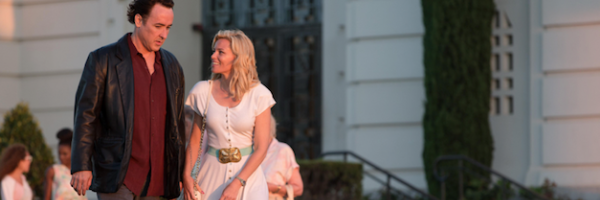SXSW Screening Highlights: Amy Schumer grows up, Steve Jobs is conflicted and Brian Wilson finds himself
This was my second year at SXSW, and although I’ve been lucky enough to enjoy a variety of film-related events at the Festival this year, three conversations really stood out to me: a veteran doc filmmaker who was forthcoming about his controversial new film, a first-time filmmaker who successfully tackled a monumental project, and a writer/comedian who is breaking barriers. All three of them took risks this year with high-profile films and lived to tell about it. Here are some moments from their conversations at the festival:
Steve Jobs: The Man in the Machine
Directed by Alex Gibney
Prolific documentary filmmaker Alex Gibney’s interest in creating a documentary on Apple CEO Steve Jobs was sparked by the enormous public grief over Jobs – “why so much for this particular person? He was very much a counterculture person,” said Gibney. Jobs’ interpersonal relationships and obsessive nature are the focus of this controversial documentary, which became one of the most talked-about films at SXSW this year.
Man in the Machine is not a traditional study of a public figure in that it doesn’t take you from start to finish. Instead, Gibney opted for a cyclical narrative, starting with Job’s death. “This kind of structure is not unlike Citizen Kane,” said Gibney. “You find people [in Jobs’ life] who illuminate the story. There is a lot that is skipped over, but I felt that focusing on a few key people and key moments was important.”
In particular, Gibney chose to examine Jobs’ relationship with his neglected daughter Lisa. “Through the film, you can see these enormous issues Steve had with paternity.” According to one of the film’s subjects, “he both felt rejected and felt special at the same time.” Gibney went on to say, “it was so cruel that he would deny paternity [to Lisa], and yet he put it into his product. His startling lack of empathy for other people was very telling.”
The film also repeatedly circles back to Jobs’ interest in Zen teachings and philosophy. “I think what he got out of Zen was very superficial,” said Gibney. “It was about the beauty of the design but not about how you can express those ideas to other human beings. His perspective was, ‘we make beautiful products that people love, and that’s it.’ After forging this great company he didn’t take with him the idea of really making the world a better place.”

Love & Mercy
Directed by Bill Pohlad
Love & Mercy, the highly anticipated Brian Wilson biopic, which stars Paul Dano, John Cusack and Elizabeth Banks, also breaks from the traditional biopic structure and instead concentrates on two key points in Wilson’s life.
According to first-time director Bill Pohlad, “the structure was in the script and original idea. Melinda Wilson told me about how she and Brian met. She met this amazing, charming, unusual guy and then later found out he was Brian Wilson. And then of course we had to cover the Pet Sounds era. So we decided to stick to those two [periods] primarily and create a more intimate portrait.”
The film boasts an impressive original score by Atticus Ross, who took Wilson’s body of work as a foundation for his brilliantly complex, layered score. After searching for weeks for the right composer for the film, “the first person I talked to that really resonated with us was Atticus Ross,” said Pohlad. “We sat down originally and used Revolution 9 and the Beatles White Album as a template. We did not want to compete with Brian’s music. I mean, how can you?” Instead, Pohlad and Ross’ approach was to rework and reweave Wilson’s work. “Everything you hear is Brian’s music… just remixed.”
Brian Wilson participated in the Q&A after the Love & Mercy premiere. When asked about how he felt while watching the film, Wilson responded, “I was overwhelmed.”

Trainwreck
Directed by Judd Apatow
One of the most packed screenings at sxsw this year, with lines wrapping around Austin’s Paramount Theatre for several blocks, was Judd Apatow’s work-in-progress screening of Trainwreck. The romantic comedy features comedians Amy Schumer and Bill Hader in their first roles as leads in a studio romantic comedy.
Schumer, who wrote Trainwreck, weighed in on her relationship with romantic comedies: “I was raised on fairy tales. But I also noted that everyone’s mom is dead and real princesses get beheaded. I just have a more realistic view of it, and so does Judd. I feel like I’m good at towing the line of what’s forgivable.”
Regarding her co-star Bill Hader’s breakthrough as a romantic lead, Schumer said, “I think Judd saw this for Bill Hader for a long time. And we just hit it off right away. We had the best time on set.” Then she joked, “if a studio’s cool with me being in their film, I think they’d be cool with Bill.”
After fielding several questions about what it means to be a woman working in comedy today, Schumer spoke up about one tiresome double standard that she often comes across: “club owners will come up to me after a show and say, “hey, you talk a lot about sex.” And I’m like, “get the f*ck out of here. Would you say that to Louie? Would you say that to Attell? That bothers me.”
She also revealed the theme of the upcoming third season of her Comedy Central show Inside Amy Schumer: “This is the season of the ass. As someone with an ass, it was like black guys were the only ones into ass. And then Nicki Minaj all of a sudden made one video and white guys are like, ‘maybe I’m into ass.’ It’s too late, white guys! Ass is in this year, in the writers room.”
When asked what advice would she give her 16-year-old self, Schumer responded, “you’re gonna gain weight. You’re gonna get HPV. And that’s okay.”
Lee Jameson / Film Education Manager
